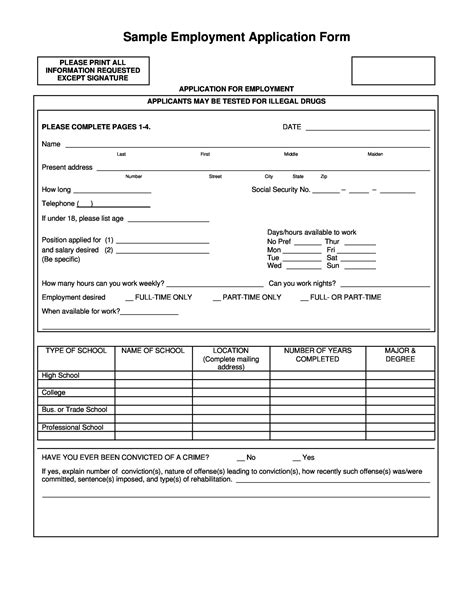Essential Job Application Documents: A Comprehensive Guide

If you’re looking for a job, you know that creating a strong application is essential. But what documents do you need to include? And how can you make sure they stand out to potential employers? In this comprehensive guide, we’ll cover everything you need to know about creating essential job application documents that will get you noticed.
1. Resume
Your resume is typically the first thing employers will see when you apply for a job. It’s a summary of your work experience, education, and skills. Here are some tips to make your resume stand out:
- Tailor your resume to the specific job you’re applying for
- Use bullet points to highlight your accomplishments
- Keep it concise and easy to read
- Include relevant keywords
If you’re struggling to create a strong resume, consider hiring a professional resume writer or using a resume builder tool.
2. Cover Letter
Your cover letter is a chance to introduce yourself to potential employers and explain why you’re the best candidate for the job. Here are some tips for writing a great cover letter:
- Address the hiring manager by name
- Explain why you’re interested in the job
- Highlight your relevant experience and skills
- Keep it concise and focused
Make sure to proofread your cover letter carefully and customize it for each job you apply for.
3. References
Some job applications may ask for references who can vouch for your skills and experience. Here are some tips for choosing and preparing your references:
- Choose people who know you well and can speak to your abilities
- Ask for permission before listing someone as a reference
- Provide your references with a copy of your resume and job description
- Follow up with your references to let them know when you’ve applied for a job
4. Letters of Recommendation
In some cases, letters of recommendation can be even more powerful than references. These are typically longer, more detailed letters written by people who know you well and can speak to your skills and character. Here are some tips for requesting letters of recommendation:
- Choose people who know you well and can provide specific examples of your work
- Provide your recommenders with a copy of your resume and job description
- Follow up with your recommenders to make sure they’ve submitted the letter
5. Writing Samples
Depending on the job you’re applying for, you may be asked to provide writing samples to demonstrate your skills. Here are some tips for choosing and preparing your writing samples:
- Choose samples that are relevant to the job
- Make sure your samples are well-written and error-free
- Provide context for each sample, such as the purpose of the piece and your role in creating it
6. Transcripts
If you’re applying for a job that requires a certain level of education, you may need to provide transcripts to prove that you meet the requirements. Here are some tips for requesting and submitting transcripts:
- Request transcripts well in advance of the application deadline
- Make sure your transcripts are official and include all relevant coursework
- Submit transcripts as early as possible to avoid delays
7. Portfolios
If you work in a creative field, you may be asked to provide a portfolio of your work. Here are some tips for creating a great portfolio:
- Choose your best work to showcase
- Provide context for each piece, such as the purpose of the project and your role in creating it
- Make sure your portfolio is well-organized and easy to navigate
8. Thank You Notes
After you’ve applied for a job and had an interview, it’s a good idea to send a thank you note to the interviewer. Here are some tips for writing a great thank you note:
- Send your note within 24-48 hours of the interview
- Thank the interviewer for their time and reiterate your interest in the job
- Mention something specific from the interview to show that you were paying attention
9. Social Media Profiles
In some cases, employers may look at your social media profiles as part of the application process. Here are some tips for creating social media profiles that will impress potential employers:
- Keep your profiles professional and up-to-date
- Remove any inappropriate content
- Share content that showcases your skills and interests
10. Conclusion
Creating essential job application documents can be a daunting task, but with the right approach, you can stand out from the competition. By following the tips in this guide and putting in the time and effort to create strong, customized documents, you’ll be on your way to landing your dream job.
FAQs
What if I don’t have any work experience?
If you’re just starting out in your career, focus on highlighting your education, skills, and any relevant internships or volunteer work you’ve done. You can also consider including a personal statement that explains your career goals and why you’re interested in the job.
Do I need to include a cover letter with every job application?
It’s a good idea to include a cover letter with every job application, unless the employer specifically states otherwise. Even if a cover letter isn’t required, it can help you stand out and make a strong impression on potential employers.
What if I don’t have any writing samples?
If you’re applying for a job that requires writing samples and you don’t have any, consider creating some on your own. You could write a blog post, create a social media campaign, or develop a marketing plan for a hypothetical company.
Should I follow up with potential employers after submitting my application?
It’s generally a good idea to follow up with potential employers after submitting your application, either via email or phone. This can show that you’re interested in the job and help you stand out from other applicants.
